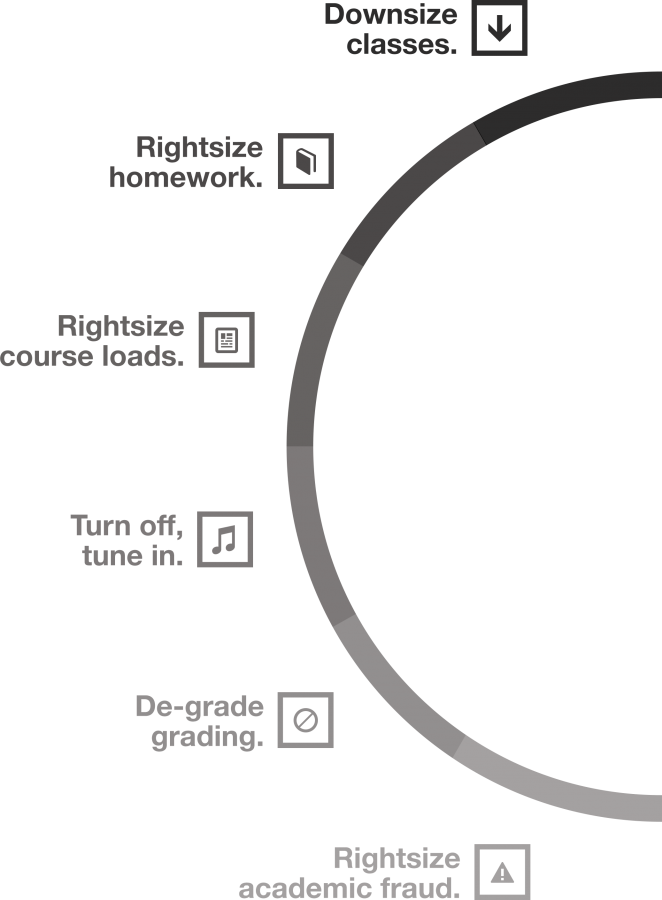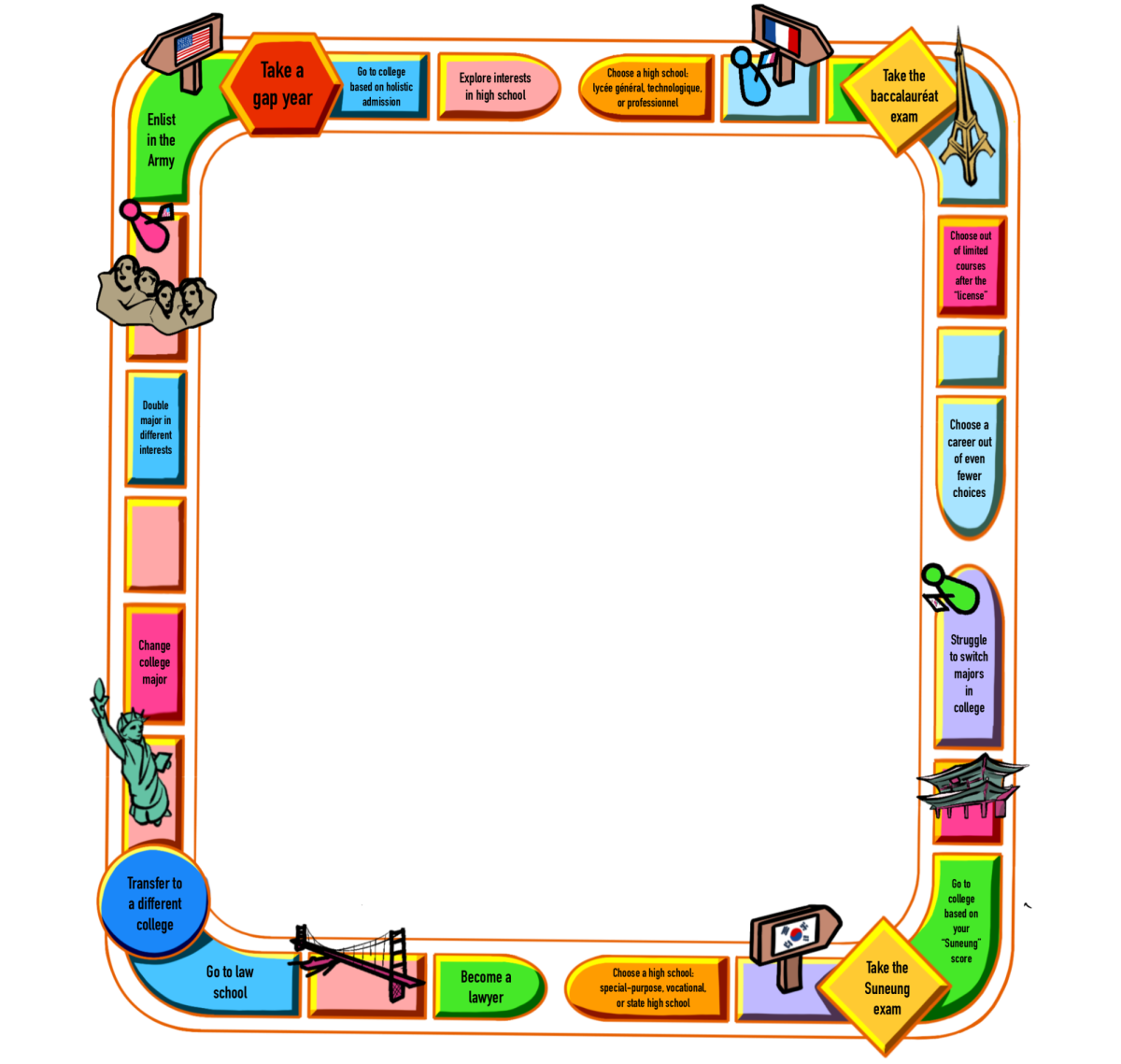The recent suicides involving Gunn students have incited the “Save the 2008” plan, a grassroots effort that was presented to the school board in November 2014. The plan makes several proposals, including a private forum specifically for homework and the prohibition of mobile phones on campus. The purpose of this plan is to decrease student stress and possibly assuage student mental health. However, the plan—which misperceived the causes for student stress as purely academic—will ultimately be ineffective. Student stress is not solely caused by academic factors, and this plan suggests many academic stress-decreasing ideas, but fails to propose changes that address the mental health issues that cause suicide.
The six points of the “Save the 2008” plan are to downsize classes, rightsize homework, rightsize course loads, prohibit mobile phones, decrease grading and rightsize academic fraud. However, the district is moving to take measures to improve the mental health of the student body, with discussions of reform taking place among administration.
Regarding the private homework forum aspect of the plan, student stress is not simply caused by handling too heavy a workload; in fact, according to National Alliance on Mental Illness the leading causes for teenage suicide are due to emotional and mental issues such as a breakup, a substance-related disorder, or family turmoil—challenging academics may add onto the original troubles but they are not the fountainhead themselves. According to a study done by Assistant Professor of Economics Benjamin Hansen of University of Oregon, suicide rates skyrocket during school months since high schools are too densely packed with students and as a result teens feel isolated with no strong friendship bonds. Therefore, instead of decreasing the academic load which helps students retain knowledge they learn, it would be much more effective to reform the counseling program by increasing the number of ACS counselors and making more mental health resources available to foster a closer and more supportive community.
Moreover, though the plan of abolishing usage of mobile phones on campus during the school day seems sound on paper, it does not actually alleviate any student stress related to mental health. According to Savethe2008.com, the reason this clause exists in the plan is that “no serious student should have to sit in class with her cell in her bag or his cell in his pocket, and be anxious when it glows or it vibrates” and that “texting is addictive” which does not seem to be directly correlated to students’ emotional well-being and instead seems almost intrusive on students’ individual freedoms. This can instead add onto student stress instead of take away from it, because many students use mobile devices as a means to communicate thoughts and feelings with peers.
The fifth clause of the plan advocates decreasing the number of progress reports sent home per year from 12 to 4 because “it is a Law of Nature that young people will never like or respect a teacher who sends grades home every 3 weeks.” However, this seems counterintuitive because decreasing the number of progress reports decreases transparency between the staff and the students; a decreased frequency of communication would then increase student stress. Not only is it flawed on the surface level, but this operative does not address the issue of student mental and emotional health either as this is another—failed—attempt at reforming academia, not the core of the issue which is social-emotional support.
Some aspects of the “Save the 2008” plan do have some merit, such as its suggestions of rightsizing course loads. This proposal would require students to discuss course schedules in a parent-counselor meeting. Students retain autonomy but still are aware of the potential costs of overloading on APs.
This suggestion—in addition to ways to decrease academic fraud—helps promote a better academic environment for stressed students. However, these proposals aren’t directly relevant to the students’ mental health. A much more pertinent plan would be to increase the number of resources available to students struggling with issues outside of school, and form a permanent active network of students and staff solely for the purpose of the campus’ emotional health.
Gunn has already moved to make things less academically stressful than in previous years. It did not seem to prevent the unfortunate suicide in November. The main issue to combat stress in the student body therefore is not to focus on the academic stresses students face, but rather to increase communications within the campus and improve mental and emotional health by opening up outlets for students to share their burdens with others, as from past studies social circumstances have been the main cause for intense stress. When faced with an issue, the most effective way to combat the issue is by killing its cause; focusing on decreasing academic stress as the main way to exterminate this concern will only prove useless.
—Unsigned editorials represent the majority opinion of the staff (assenting: 36; dissenting: 0; abstaining: 1)













George Orwell • Feb 9, 2015 at 4:57 pm
How phones contribute to stress is the same as how having a bottle of alcohol in your pocket contributes to stress of an alcoholic with no will power. It puts huge pressure for self control onto someone who has little self control. And teenagers dont have as much self control as adults anyway. Social media is also a huge problem for social bullying, pressure to conform to unrealistic and carefully fake casual manufactured life shots Social media also sets up more stress when a careless non-fake comment or shot gets posted. College admissions and employers look at online profiles and screen out people who may have appeared doing something slightly off online. It also takes away the true relaxation and pleasure in social events as everyone is always posing for selfies for the fake online life shot rather than talking heart to heart or relaxing. Texting is also a very restricted way to communicate. It dumbs you down making social interactions limited and simplistic. Friendships become fake and superficial.